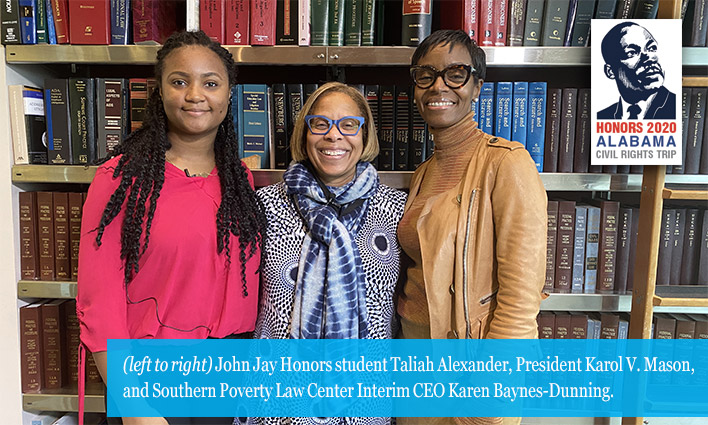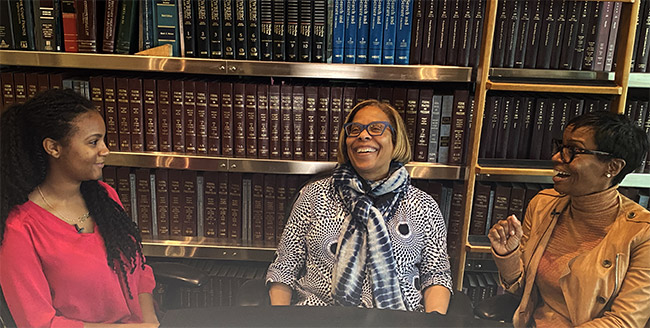
This year’s Honors Alabama Civil Rights trip would not be complete without visiting the Southern Poverty Law Center (SPLC). On the second day of the trip, the students listened to presentations from various Southern Poverty Law Center departments, including: the Criminal Justice Reform Practice Group, the Intelligence Project, Teaching Tolerance, the Voting Rights Practice Group, and the Economic Justice Practice Group. But, one very lucky student named Taliah Alexander ’22, a Law and Society major, got the opportunity to interview John Jay President Karol V. Mason and the Southern Poverty Law Center Interim CEO Karen Baynes-Dunning. The trio touched on issues of justice that directly impact our communities.
Baynes-Dunning: We’ve been so excited about you, President Mason, your students, and your staff coming down here to Alabama. We really believe that our country’s emerging leaders are on college campuses. Students have a fire under them. They know the issues, and they’re active in their communities. Here at the Southern Poverty Law Center we feel like we’re learning just as much from the students as they’re learning from us. I was just sharing with some of your students that you are a very unique university president. You’re laser-focused on student success, what the students’ experiences are, how they develop, and what they’re exposed to. That’s going to make a big difference in their lives. John Jay has a history of having amazing students. They’ve been at the forefront of social justice issues, and your leadership really matters. I think it’s important for students to see a woman of color who is extremely passionate about their journey.
Mason: I always look forward to the day when I’m sitting on my rocking chair, looking at the new President of the Southern Poverty Law Center on television—or leading something else impressive—and I hear that they’re a John Jay alumni member. We’ve got 15,000 students and the possibilities for their future are limitless. I believe that this is the beginning of a long partnership between John Jay and the Southern Poverty Law Center.
Baynes-Dunning: I’d love to get some of your students here during the summer. I’d love to reach out and work more with your faculty.
“We can’t have student success without the dedicated hard work and guidance from our faculty members.” —Karol V. Mason
Mason: I’m glad you said that, because I am laser-focused on student success, but I’m equally devoted to the success of our faculty. We can’t have student success without the dedicated hard work and guidance coming from our faculty members. One of our successful Honors students is with us right now. Taliah, what has your experience on the trip been like so far?

Alexander: Coming here to Alabama, I was really excited to learn the civil rights history firsthand. At the Voting Rights Museum we heard a story from someone who was arrested twice by the time he was 11 years old. He was just fighting for the right to vote. That was really powerful. And, on the walk to the Southern Poverty Law Center we all noticed that there was a plaque on every corner dedicated to civil rights activists and different civil rights events. There’s a rich history in the South, in Alabama, and in Montgomery.

Mason: One of the things I hope our students hear and learn is that people tend to demonize the South, but the South doesn’t own all the troubles. And, in many ways, the South has provided the solution. If you think about movements in the United States, many of them started right here in the South. Listening to you talk about that 11-year-old boy, who was arrested back in the ’60s, reminds us that leadership isn’t about age. We all talk about our students as our future leaders and our emerging leaders, but you’re leaders right now. Your voice matters now in that same vein.
“People tend to demonize the South, but the South doesn’t own all the troubles. And, in many ways, the South has provided the solution.” —Karol V. Mason
Alexander: Understanding how important activism is for social change, how would you say John Jay specifically fosters an environment where students can be activists and participate in activism?

Mason: One of the things we’ve learned here at the Southern Poverty Law Center is that they don’t want you to just learn history, they want you to leave thinking about what you can do to positively change the world. And, from the questions that you guys are asking, I have no doubt that you will take this information and figure out what to do next. One of the specific things we’re definitely going to be seeing in our community, and talking about back in New York, is the power of voting. To me, voting is sacred because my parents were in the generation that had to fight for black folks being able to vote. So, one of the things we’re doing now is making sure people are registered to vote. John Jay is set in place to help get people registered to vote in New York. We’re also making sure that people get counted in the 2020 Census, because those are things that are critical to using your voice, and we’re counting on students to get people to actively participate.
Alexander: Something else that I’ve learned at the Southern Poverty Law Center, and I’ve found really interesting, is the rise of hate crimes across the country and the different forms that it’s taking on the internet and social media platforms. They’re in podcasts. They’re infiltrating the media and schools. How do you think that John Jay, and other institutions, can protect vulnerable groups from this rise in hate crimes and white nationalism?
“To me, voting is sacred because my parents were in the generation that had to fight for black folks being able to vote.” —Karol V. Mason
Mason: I think that young people are going to be innovators thinking about new ways to reach people through technological tools to counteract those influences. We’re [looking at Baynes-Dunning] not going to think of it because we don’t use technology in the way that our students do. Throughout our students’ lives, most of them have had a computer or an iPhone in their hands. They see the world and experience the world very differently from older generations.
Baynes-Dunning: I would encourage students to seize the opportunity to capture the narrative. You have these social networks and the ability to put out messages very differently from the way that we put them out in the past. When they did the bus boycott here in Montgomery, they decided they would stop using buses on a Friday, and that weekend they ran a mimeograph—
Mason: I don’t think Taliah knows what a mimeograph is. Photocopies.
Baynes-Dunning: Right, they made copies and they posted them all over Montgomery, and by Monday morning, nobody was on the bus. Now, students like yourself have the ability to hashtag something and reach millions.
Also, there are companies and corporations that either unknowingly or tacitly support these hate groups because of the profit margin. Whether it’s hosting their convenings at their hotels, or some other form of support, it’s external pressure that gets them to do things differently. For example, Hyatt hotels is one of the only hotel chains that now has a policy against hate groups using their facilities. It makes you question what’s happening at the other hotel chains and what you can do about that, doesn’t it? Your voice can really move some of these huge corporations in a big way.
Mason: It’s a new twist on an old model.
- Honors 2020 Alabama Civil Rights Trip: Pre-Trip Excitement and Expectations
- Honors 2020 Alabama Civil Rights Trip: Exploring Selma
- Honors 2020 Alabama Civil Rights Trip: An Introspective Essay From Denny T. Boodha ’22
- Honors 2020 Alabama Civil Rights Trip: A Reflective Poem From Isaac Paredes ’21



